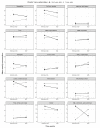Fussy Eating among Children and Their Parents: Associations in Parent-Child Dyads, in a Sample of Children with and without Neurodevelopmental Disorders
- PMID: 34202394
- PMCID: PMC8308294
- DOI: 10.3390/nu13072196
Fussy Eating among Children and Their Parents: Associations in Parent-Child Dyads, in a Sample of Children with and without Neurodevelopmental Disorders
Abstract
Parents are important agents in shaping children's eating habits. However, the associations between children's and parents' eating behaviors are complex and may be convoluted for various reasons, such as parenting feeding styles, stressful mealtimes, and children's neurodevelopmental disorders (ND), such as Autism Spectrum Disorder (ASD) and Attention-Deficit/Hyperactivity Disorder (ADHD). The purpose of this study was to analyze associations between parents and their children's fussy eating, in a cross-sectional sample of children, with and without ND. Ninety-seven parents answered screening questionnaires prior to an intervention study. Associations were investigated using two-way ANOVAs and chi-square analyses. Overall, children with ND accepted fewer food items and consumed unhealthier foods more frequently than children without ND. Fussy eating parents had children who accepted fewer food items and consumed unhealthier foods more frequently than children whose parents were not fussy eaters. Interaction effects were not significant. A higher proportion of fussy eating parents, than non-fussy eating parents, had children who had difficulties with combined foods and hidden ingredients. The findings highlight the need for further investigation into the relationships between parents' influence on their children's eating behavior and food consumption, as well as possible reciprocal impacts.
Keywords: ADHD; autism spectrum disorder; eating behaviors; fussy eating; neurodevelopmental disorders; parent-child dyads.
Conflict of interest statement
The authors declare no conflict of interest. The funders had no role in the design of the study; in the collection, analyses, or interpretation of data; in the writing of the manuscript or in the decision to publish the results.
Figures
Similar articles
-
'Fussy eating' and feeding dynamics: School children's perceptions, experiences, and strategies.Appetite. 2022 Jun 1;173:106000. doi: 10.1016/j.appet.2022.106000. Epub 2022 Mar 9. Appetite. 2022. PMID: 35278591
-
A thematic cluster analysis of parents' online discussions about fussy eating.Matern Child Nutr. 2022 Apr;18(2):e13316. doi: 10.1111/mcn.13316. Epub 2022 Feb 8. Matern Child Nutr. 2022. PMID: 35132813 Free PMC article.
-
Taste education - A food-based intervention in a school setting, focusing on children with and without neurodevelopmental disorders and their families. A randomized controlled trial.Appetite. 2021 Dec 1;167:105623. doi: 10.1016/j.appet.2021.105623. Epub 2021 Aug 8. Appetite. 2021. PMID: 34371121 Clinical Trial.
-
Parental influences on children's eating behaviour and characteristics of successful parent-focussed interventions.Appetite. 2013 Jan;60(1):85-94. doi: 10.1016/j.appet.2012.09.014. Epub 2012 Sep 24. Appetite. 2013. PMID: 23017468 Review.
-
Associations between parenting stress, parent mental health and child sleep problems for children with ADHD and ASD: Systematic review.Res Dev Disabil. 2019 Oct;93:103463. doi: 10.1016/j.ridd.2019.103463. Epub 2019 Aug 22. Res Dev Disabil. 2019. PMID: 31446370
Cited by
-
An mHealth Intervention Promoting Physical Activity and Healthy Eating in a Family Setting (SMARTFAMILY): Randomized Controlled Trial.JMIR Mhealth Uhealth. 2024 Apr 26;12:e51201. doi: 10.2196/51201. JMIR Mhealth Uhealth. 2024. PMID: 38669071 Free PMC article. Clinical Trial.
-
Changes in Anxiety following Taste Education Intervention: Fussy Eating Children with and without Neurodevelopmental Disorders.Nutrients. 2023 Nov 15;15(22):4783. doi: 10.3390/nu15224783. Nutrients. 2023. PMID: 38004177 Free PMC article.
-
Changes in Eating Behaviors Following Taste Education Intervention: Focusing on Children with and without Neurodevelopmental Disorders and Their Families: A Randomized Controlled Trial.Nutrients. 2022 Sep 27;14(19):4000. doi: 10.3390/nu14194000. Nutrients. 2022. PMID: 36235654 Free PMC article. Clinical Trial.
-
Feeding-Related Early Signs of Autism Spectrum Disorder: A Narrative Review.J Pers Med. 2024 Aug 2;14(8):823. doi: 10.3390/jpm14080823. J Pers Med. 2024. PMID: 39202014 Free PMC article. Review.
-
The Role of Choline in Neurodevelopmental Disorders-A Narrative Review Focusing on ASC, ADHD and Dyslexia.Nutrients. 2023 Jun 25;15(13):2876. doi: 10.3390/nu15132876. Nutrients. 2023. PMID: 37447203 Free PMC article. Review.
References
-
- Ezzati M., Lopez A.D., Rogers A., Murray C.J.L. Comparative Quantification of Health Risks: Global and Regional Burden of Disease Attributable to Select Major Risk Factors. World Health Organization; Geneva, Switzerland: 2004.
-
- Riordan F., Ryan K., Perry I.J., Schulze M.B., Andersen L.F., Geelen A., Veer P.V., Eussen S., Dagnelie P., Wijckmans-Duysens N., et al. A systematic review of methods to assess intake of fruits and vegetables among healthy European adults and children: A DEDIPAC (DEterminants of DIet and Physical Activity) study. Public Health Nutr. 2016;20:417–448. doi: 10.1017/S1368980016002366. - DOI - PMC - PubMed
MeSH terms
Grants and funding
LinkOut - more resources
Full Text Sources
Medical



